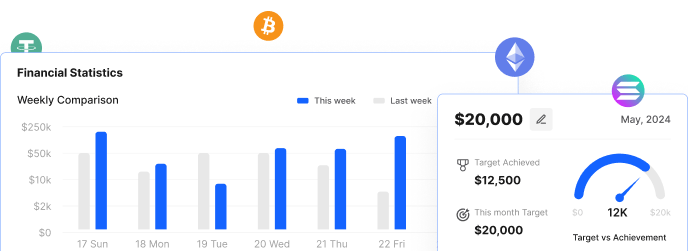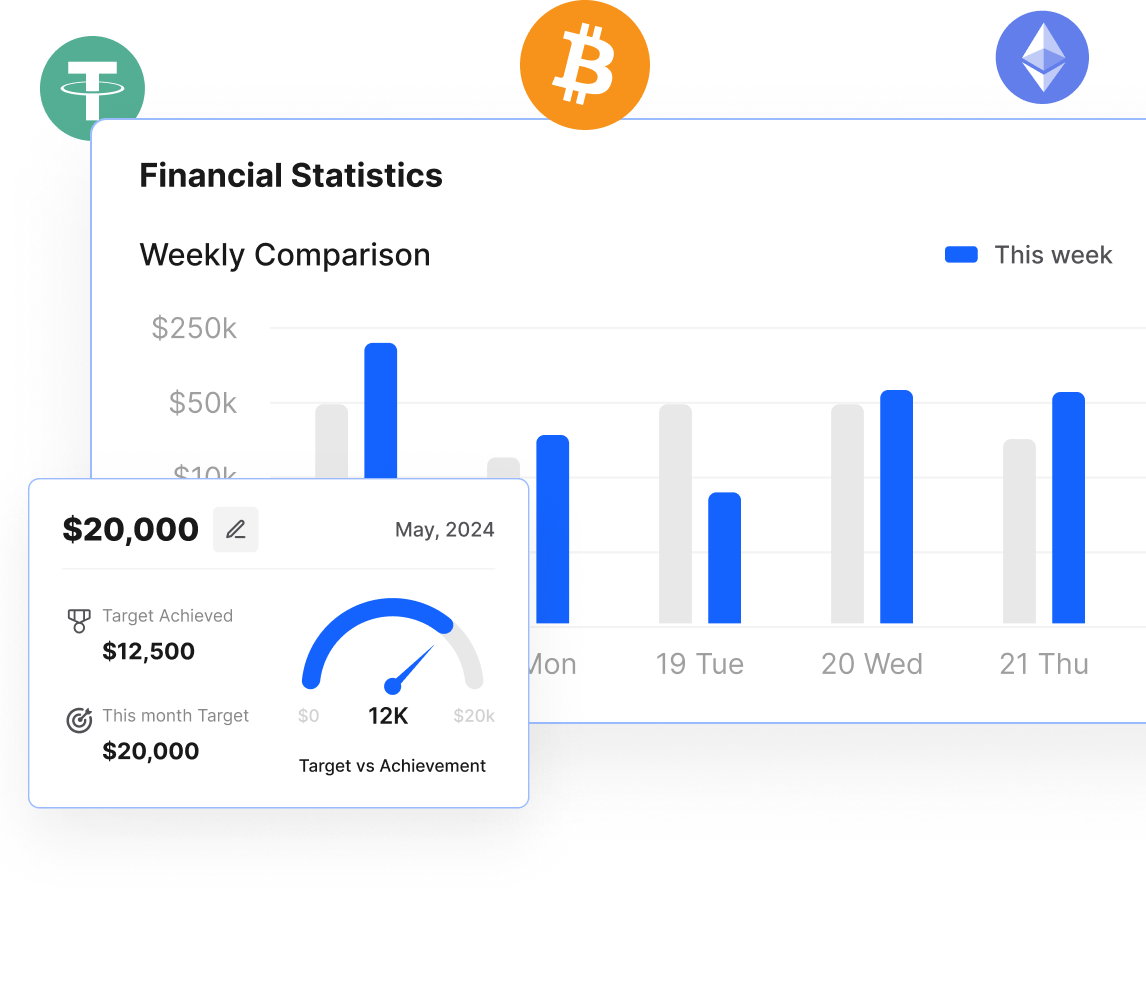Work with a Trusted Crypto Tax Professional Today
Reconcile, Report, and File your Crypto Taxes on Time
No more confusion around crypto tax rules. We help crypto investors, traders, and businesses stay compliant by reporting taxable events and filing IRS-ready returns accurately for all your crypto activity.
- 1000+ happy clients
- Audit-ready reports & accurate reconciliation
- Fast turnaround times


JUST A FEW OF THE COMPANIES WE’VE SUPPORTED OVER THE YEARS
Why You Need a Crypto Tax Professional
IRS Rules Are Changing. Let’s File Your Crypto Taxes Right.
Crypto tax laws shift rapidly as IRS scrutiny increases. Our crypto tax professionals help you stay compliant and file accurately, so you’re protected during tax season.
Cryptocurrency isn’t a niche asset anymore and the IRS is paying attention. You need more than DIY accounting software to file your crypto taxes correctly as tax regulations continue to change.
At Onchain Accounting, we have helped over 175 blockchain businesses and crypto traders with crypto tax compliance for over 8 years. Working with an expert crypto tax professional is important for the following reasons:
Crypto transactions are hard to track.
Your crypto transactions can be classified as swaps, staking rewards, bridge transfers, wrapped tokens, rebasing, and more. Even a few transactions can lead to hundreds of taxable events. An experienced crypto tax professional helps you by:
- Reconstructing your transaction history across wallets and exchanges
- Identifying taxable and non-taxable events
- Calculating cost basis correctly
- Avoiding costly errors by classifying transactions accurately
You could be missing out on tax-saving opportunities.
There are legitimate ways to reduce your crypto tax liability. A long-term tax strategy is needed where every aspect is considered, including entity structure and quarterly payments to grow your business in a tax-efficient manner. You can look into applying white hat strategies with one of our crypto tax accountants who have expertise in evaluating what’s best for your crypto investment:
- Using capital loss harvesting strategies
- Identifying long-term vs. short-term gains
- Optimizing the treatment of staking/yield rewards
- Structuring crypto business income for more favorable taxation
New IRS regulations are emerging.
Digital assets like cryptocurrency are treated as property. Your crypto tax reporting obligations change with new rules coming up under the Infrastructure Bill and updated cost basis requirements. Our crypto tax professionals are already on it to keep your filings compliant and audit-ready while making sure that your financial growth is minimally affected. Since crypto is one of the IRS’s top enforcement priorities, inaccurate filings can lead to:
- Penalties for underreporting
- Interest on unpaid taxes
- Criminal charges (in some cases)
Software alone isn’t enough.
While tools like Koinly and CoinTracker are helpful, they aren’t a substitute for expert review. Errors with your tax filing process such as wallet mismatches, missing cost basis, incorrect token classification, or improper treatment of DeFi/NFT transactions can go unnoticed on some occasions. A crypto tax professional has the knowledge to audit these tools’ output before filing your taxes.
Partner with a Team That Has Been Doing Crypto Taxes Since 2016
Investors
Traders
Founders
Crypto businesses
We set you up for long-term financial growth with crypto with expert crypto tax planning. Let’s talk.

What Your Crypto Tax Professional Needs to File Your Taxes
When working with one of our crypto tax professionals, we make sure that your time is saved by keeping everything organized. Here’s what we’ll need to ensure your tax filing is complete and audit-ready:
Crypto tax filing requirements
Description
Your full crypto transaction history
Make sure to gather your complete crypto activity. Our tax professionals can help you with this process. We’ll need:
- CSV exports or API integrations from all exchanges (e.g., Coinbase, Binance, Kraken)
- Wallet addresses for on-chain activity
- DeFi platforms you have used for staking, lending, yield farming
- NFT marketplaces
- Any cross-chain transactions
This transaction history is important to identify all your taxable events.
Dates and cost basis for all acquisitions
Calculating gains and losses accurately is a critical task that requires the following details of each crypto acquisition:
- Initial purchase date and price
- Any transaction fees paid
- Historical pricing data for tokens
Where data is missing, our crypto tax experts can reconstruct it by using blockchain explorers and pricing tools.
Details of Crypto Income
Any crypto you earned must be reported as income at fair market value. Our crypto tax accountants need the following data to report crypto income:
- Amount and type of income
- Date received
- Source
NFT Activity
NFT-related tax treatment depends on how and when you bought, sold, or created the assets. We’ll be using the following data for NFT activity:
- Minting costs
- Dates of purchase and sale
- Royalties earned
- Marketplace used
1099 Forms and Exchange Reports
These need to be included in your tax documents where available.
Previous Year’s Tax Returns
If this is your first year working with us, our crypto tax professionals will want to review your previous crypto filings. We’ll correct any errors and carry forward unused losses.
Business information
This is applicable for crypto businesses. If you are operating a DAO, DeFi protocol, NFT project, or Web3 business, we’ll need:
- Entity structure (LLC, C-Corp, DAO, etc.)
- Crypto and fiat bank statements
- Invoices, payroll, and expense documentation
- Wallets and smart contracts used in business operations
Crypto Tax Forms You Can’t Miss to Be Audit Ready
A trusted crypto tax professional ensures that all your crypto tax forms are filed before deadlines while you focus on expanding your crypto portfolio. Here’s a breakdown of the main tax forms associated with crypto activities:
Form 8949
This form lists every taxable crypto event with details like date acquired, sold, proceeds, and cost basis. It’s used to report capital gains and losses from the sale or disposition of crypto assets.
Schedule D
What if you didn’t make any money from crypto this year? Your losses can help since the IRS allows a deduction of up to $3,000 in capital losses each year from other income, like your salary or freelance earnings. If your losses are over $3,000, you can carry them forward and use them in future years.
Schedule 1
If you have earned crypto from airdrops, hard forks, referral rewards, bonuses, and other crypto income, these need to be reported here for compliance.
Schedule B
Any interest earned from DeFi platforms, staking, or crypto savings accounts goes here. Our crypto tax accountants identify any income that falls under this category to report as interest.
Schedule C
If you mined crypto, you’ll owe taxes on your earnings depending on the fair market value of the mined coins at the time they were received. Crypto mining can be reported as business income or self-employment income for crypto tax reporting on Schedule C.
Form 1099-MISC
Some exchanges and platforms will send this form when you earn more than $600 in rewards. If the IRS gets it, your return should match. Our crypto tax professional cross-checks income documents you receive to avoid any mistakes.
Form 1040
Using spreadsheets or generic tools may miss trade history, result in double-counting, or create discrepancies with exchange records.
Form 8938 and FBAR (FinCEN 114)
If you use foreign exchanges or wallets, you might have to disclose holdings under FBAR (Foreign Bank and Financial Account Reporting) and FATCA (Foreign Account Tax Compliance Act). Holding more than $10,000 in foreign financial accounts requires FBAR filing.
Form 8949
This form lists every taxable crypto event with details like date acquired, sold, proceeds, and cost basis. It’s used to report capital gains and losses from the sale or disposition of crypto assets.
Schedule D
What if you didn’t make any money from crypto this year? Your losses can help since the IRS allows a deduction of up to $3,000 in capital losses each year from other income, like your salary or freelance earnings. If your losses are over $3,000, you can carry them forward and use them in future years.
Schedule 1
If you have earned crypto from airdrops, hard forks, referral rewards, bonuses, and other crypto income, these need to be reported here for compliance.
Schedule B
Any interest earned from DeFi platforms, staking, or crypto savings accounts goes here. Our crypto tax accountants identify any income that falls under this category to report as interest.
Schedule C
If you mined crypto, you’ll owe taxes on your earnings depending on the fair market value of the mined coins at the time they were received. Crypto mining can be reported as business income or self-employment income for crypto tax reporting on Schedule C.
Form 1099-MISC
Some exchanges and platforms will send this form when you earn more than $600 in rewards. If the IRS gets it, your return should match. Our crypto tax professional cross-checks income documents you receive to avoid any mistakes.
Form 1040
Using spreadsheets or generic tools may miss trade history, result in double-counting, or create discrepancies with exchange records.
Form 8938 and FBAR (FinCEN 114)
If you use foreign exchanges or wallets, you might have to disclose holdings under FBAR (Foreign Bank and Financial Account Reporting) and FATCA (Foreign Account Tax Compliance Act). Holding more than $10,000 in foreign financial accounts requires FBAR filing.
What You Need to Know About Reporting Crypto Losses on Your Taxes
Even if you didn’t profit this year, unreported losses can cost your future tax benefits and raise concerns with the IRS. Let’s turn your crypto losses into a smart tax strategy.
Costs of Hiring a Crypto Tax Professional
The cost of hiring a crypto tax professional can range from $500 to $5,000+, depending on the complexity of your crypto activity. Pricing depends on:
- Number of transactions: High-volume traders, DeFi users, and NFT investors usually require more time for reconciliation.
- Types of activity: Staking, mining, airdrops, and cross-chain transactions add complexity.
- Need for cleanup: If your records are disorganized or incomplete, additional work is required.
- Business vs. individual: Crypto businesses usually need monthly reporting and tax structuring, which increases cost.
At OnChain Accounting, we offer transparent and tiered pricing based on your transaction volume and tax needs. With digital assets, our clients save more in avoided penalties, missed deductions, and IRS audit protection than what they pay for our services.

What we offer
Reliable Cryptocurrency Tax Accounting Services to Stay Compliant
Our crypto tax professionals track every transaction to organize your data and file accurately. Let’s clean up your records before tax season and avoid costly errors.

Crypto Tax Preparation & Filing
- Accurate calculation and reporting of crypto transactions for tax returns.
- Preparation of IRS Form 8949 and other tax documents.
- Strategic tax planning to minimize liabilities and maximize returns.
- Expert representation in case of IRS audits.

Crypto Bookkeeping & Reconciliation
- Detailed tracking and recording of all crypto and fiat transactions.
- Integration with accounting software.
- Reconciliation of wallet and exchange balances for data integrity.

DeFi & NFT Accounting
- Specialized accounting for decentralized finance activities such as staking, yield farming, and liquidity provision.
- Accurate reporting of NFT transactions (purchases, sales, and royalties).
- Management of DeFi protocols.

Mining & Staking Income Reporting
- Tracking of mining and staking rewards.
- Proper classification and reporting of income to comply with IRS guidelines.
- Accurate cost basis calculations and fair market value assessments.

Fractional CFO Services
- Strategic financial planning and analysis for growing crypto enterprises.
- Cash flow management, fundraising support, and investor reporting.
- Development of internal controls and financial policies.

International Crypto Tax Compliance
- Expertise in foreign asset reporting requirements such as FBAR and FATCA.
- Assistance with cross-border transactions and international tax obligations.
- Financial strategies that align with international tax regulations.

Crypto Tax Preparation & Filing
- Accurate calculation and reporting of crypto transactions for tax returns.
- Preparation of IRS Form 8949 and other tax documents.
- Strategic tax planning to minimize liabilities and maximize returns.
- Expert representation in case of IRS audits.

Crypto Bookkeeping & Reconciliation
- Detailed tracking and recording of all crypto and fiat transactions.
- Integration with accounting software.
- Reconciliation of wallet and exchange balances for data integrity.

DeFi & NFT Accounting
- Specialized accounting for decentralized finance activities such as staking, yield farming, and liquidity provision.
- Accurate reporting of NFT transactions (purchases, sales, and royalties).
- Management of DeFi protocols.

Mining & Staking Income Reporting
- Tracking of mining and staking rewards.
- Proper classification and reporting of income to comply with IRS guidelines.
- Accurate cost basis calculations and fair market value assessments.

Fractional CFO Services
- Strategic financial planning and analysis for growing crypto enterprises.
- Cash flow management, fundraising support, and investor reporting.
- Development of internal controls and financial policies.

International Crypto Tax Compliance
- Expertise in foreign asset reporting requirements such as FBAR and FATCA.
- Assistance with cross-border transactions and international tax obligations.
- Financial strategies that align with international tax regulations.
FAQs
Your Questions, Answered
Do I need to pay taxes on crypto I haven’t sold?
Generally, holding cryptocurrency is not a taxable event. However, if you earn income through staking, interest, or airdrops, you are still required to report and pay tax on the fair market value even if you haven’t sold the crypto.
How is DeFi activity taxed?
DeFi transactions such as lending, borrowing, yield farming, and liquidity mining are complex taxable events. Each action must be analyzed for income or capital gains implications. Working with an experienced crypto tax professional is needed for correct classification and reporting.
What’s the difference between short-term and long-term crypto gains?
If you hold crypto for less than one year before selling, it’s taxed as short-term capital gains at ordinary income rates. If held for more than one year, it qualifies for long-term capital gains with lower tax rates. Crypto tax professionals use the holding period to optimize your tax liability.
Can I still report crypto taxes from past years?
Yes. If you missed reporting crypto activity in previous years, you can file amended returns using IRS Form 1040-X. A crypto tax professional can help reconcile older records and calculate your tax obligations to avoid penalties.
What happens if I don’t report my crypto transactions?
Failing to report crypto income or gains can lead to IRS penalties, interest, and potential audits. The IRS treats cryptocurrency as property and expects accurate tax reporting, including trading, DeFi income, and NFTs.






